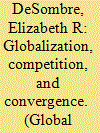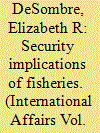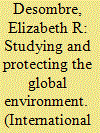|
|
|
Sort Order |
|
|
|
Items / Page
|
|
|
|
|
|
|
| Srl | Item |
| 1 |
ID:
081549


|
|
|
|
|
| Publication |
2008.
|
| Summary/Abstract |
This article examines the impact of globalization on international environmental, safety, and labor standards through the lens of impact of open registration in shipping-the ability of shipowners to choose in which states to register their ships. Shipowners have moved registration of ships to low-standard states, while traditional national registries relaxed standards in an effort to keep ship registrations. But recent successes in increasing standards have come from mechanisms of exclusion: ships that remain outside the international regulatory process are prevented from benefiting from their free riding by the imposition of trade restrictions, dockworker boycotts, and inspection and detention processes that single out those operating outside the international regulatory framework
|
|
|
|
|
|
|
|
|
|
|
|
|
|
|
|
| 2 |
ID:
168419


|
|
|
|
|
| Summary/Abstract |
Although frequently ignored in discussion of ocean security, fisheries have had central security implications throughout history. This article re-centres fisheries issues as both a cause and effect of security conflicts, and examines the implications of this re-framing for addressing this intersection. Underlying the security concerns that arise related to fisheries is depletion of global fish stocks. When stocks are overfished or not well managed, fishing vessels move to other areas, where they are more likely to come into conflict with each other and to threaten vulnerable stocks that some populations rely on, and states will claim or defend more ocean territory. These issues are explored here with four sets of security crises that can be best understood by examining the underlying or contributing aspect of fishery depletion: conflicts over sovereignty of small maritime islands, the rise of Somali maritime piracy, the ‘fish wars’ between otherwise friendly states in the middle and latter parts of the twentieth century, and the human insecurity represented by slavery-like conditions aboard some fishing vessels. Understanding the security implications of fisheries grants new reason and new approaches—ideally multi-jurisdictional, transnational and focused on capacity-building—to better protect fisheries and prevent security threats.
|
|
|
|
|
|
|
|
|
|
|
|
|
|
|
|
| 3 |
ID:
103259


|
|
|
|
|
| Publication |
2011.
|
| Summary/Abstract |
There are few issue areas within international relations in which the policy realm has followed the scholarship quite as quickly or as far as in the area of the environment. After simple identification of the existence and causes of existing environmental problems, both scholarship and policy initially focused on formal institutional approaches for addressing these problems, and both have expanded that focus to include greater consideration of informal approaches, expansion of the environmental issues considered, and concentration on the importance of nonstate actors. Critical scholarship, the one area of scholarship with little connection to policy, calls attention to the interests, power structures, and assumptions that underlie environmental behavior and suggests that small-scale improvements over business-as-usual are misleading and even counterproductive. But most environmental politics scholarship has drawn direct influence from, and contributed to, policy pertaining to the environment. Ultimately, it is likely that both scholarship and policy have been strengthened by this close connection, but at the same time, both have perhaps been narrowed by it as well, so that some important issues or approaches have been understudied. While there are advantages to the close relationship in this subfield between scholarship and policy, there may be some advantages in the future to encouraging some distance between the two, even for those ultimately concerned about the fate of the global environment.
|
|
|
|
|
|
|
|
|
|
|
|
|
|
|
|
|
|
|
|
|